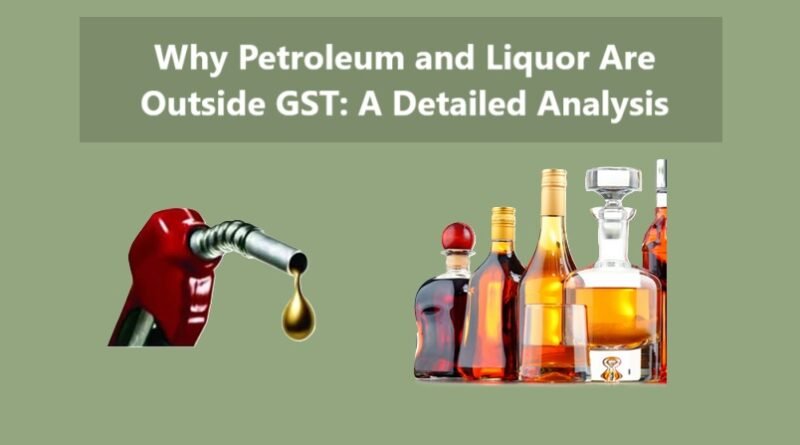Why Petroleum and Liquor Are Outside GST: A Detailed Analysis
Goods and Services Tax (GST) is a unified tax system that has replaced multiple indirect taxes in India. However, certain high-revenue generating commodities like petroleum products and liquor have been kept outside the GST framework. This article explores the rationale behind their exclusion, its impact on consumers and businesses, and the potential future implications of bringing them under GST.
1. Current Taxation Structure for Petroleum and Liquor
1.1 Petroleum Products
The following petroleum products are currently outside GST:
- Petrol
- Diesel
- Natural Gas
- Aviation Turbine Fuel (ATF)
- Crude Oil
Instead of GST, these products are taxed under the Excise Duty (Central) and Value Added Tax (VAT) (State) regime, which leads to different tax rates across states.
1.2 Liquor
Alcoholic liquor for human consumption is excluded from GST and is taxed under:
- Excise Duty (levied by states)
- VAT (state-level tax)
- Additional cesses/surcharges (varies across states)
Some alcohol-based products such as ethanol, denatured spirit, and hand sanitizers are subject to GST, but liquor remains outside the purview of GST.
2. Why Petroleum and Liquor Are Not Under GST?
2.1 Revenue Dependence of States
- Both petroleum and liquor generate high revenue for states through VAT and excise duty.
- If brought under GST, states would lose their discretionary power to tax these commodities and would have to share revenue with the central government.
2.2 Inflationary Impact
- If petroleum products come under GST, there could be initial fluctuations in fuel prices.
- A uniform GST rate might result in lower tax revenue for high-taxing states.
- Similarly, liquor taxation varies widely across states, and GST could standardize rates, potentially reducing revenue in high-tax states.
2.3 Political and Economic Concerns
- The decision to bring these items under GST requires consensus among states, which has been difficult to achieve.
- Political factors play a role as different states have varied policies on liquor and fuel taxation.
3. What If Petroleum and Liquor Are Brought Under GST?
3.1 Potential Benefits
- Uniform Taxation: A single GST rate will eliminate price variations across states.
- Input Tax Credit (ITC): Businesses will benefit from ITC on petroleum, reducing costs.
- Transparency: Eliminating multiple indirect taxes will simplify tax administration.
- Lower Fuel Prices: A GST rate lower than the current combined excise and VAT could reduce fuel prices.
3.2 Challenges
- Revenue Loss for States: States might demand higher compensation from the central government.
- Tax Rate Dilemma: If taxed at 18% GST, fuel and liquor prices may drop significantly, impacting government earnings.
- Opposition from Stakeholders: Liquor and oil industry stakeholders might resist due to compliance burdens.
4. Possible GST Models for Petroleum and Liquor
4.1 Dual Tax Structure
- A hybrid model where base tax is under GST, and states can levy additional cess.
4.2 Gradual Inclusion
- Initially including natural gas, ATF, and ethanol under GST.
- Reviewing revenue impact before adding petrol and diesel.
4.3 Revenue-Sharing Mechanism
- Developing a model where states receive compensation for lost VAT and excise duty revenues.
5. Conclusion
While petroleum and liquor remain outside GST, their inclusion could simplify taxation and reduce price disparities. However, revenue loss concerns and political factors make their transition challenging. A phased approach or a dual tax system could be viable solutions for integrating these high-revenue commodities into the GST framework in the future.

